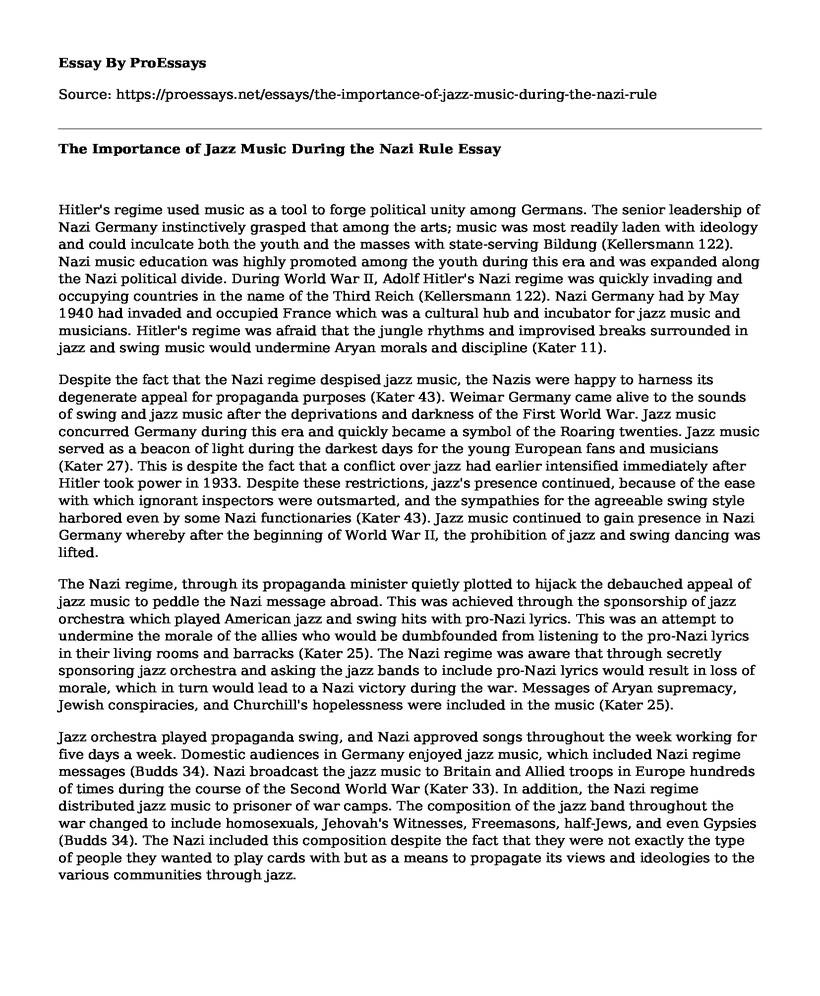Hitler's regime used music as a tool to forge political unity among Germans. The senior leadership of Nazi Germany instinctively grasped that among the arts; music was most readily laden with ideology and could inculcate both the youth and the masses with state-serving Bildung (Kellersmann 122). Nazi music education was highly promoted among the youth during this era and was expanded along the Nazi political divide. During World War II, Adolf Hitler's Nazi regime was quickly invading and occupying countries in the name of the Third Reich (Kellersmann 122). Nazi Germany had by May 1940 had invaded and occupied France which was a cultural hub and incubator for jazz music and musicians. Hitler's regime was afraid that the jungle rhythms and improvised breaks surrounded in jazz and swing music would undermine Aryan morals and discipline (Kater 11).
Despite the fact that the Nazi regime despised jazz music, the Nazis were happy to harness its degenerate appeal for propaganda purposes (Kater 43). Weimar Germany came alive to the sounds of swing and jazz music after the deprivations and darkness of the First World War. Jazz music concurred Germany during this era and quickly became a symbol of the Roaring twenties. Jazz music served as a beacon of light during the darkest days for the young European fans and musicians (Kater 27). This is despite the fact that a conflict over jazz had earlier intensified immediately after Hitler took power in 1933. Despite these restrictions, jazz's presence continued, because of the ease with which ignorant inspectors were outsmarted, and the sympathies for the agreeable swing style harbored even by some Nazi functionaries (Kater 43). Jazz music continued to gain presence in Nazi Germany whereby after the beginning of World War II, the prohibition of jazz and swing dancing was lifted.
The Nazi regime, through its propaganda minister quietly plotted to hijack the debauched appeal of jazz music to peddle the Nazi message abroad. This was achieved through the sponsorship of jazz orchestra which played American jazz and swing hits with pro-Nazi lyrics. This was an attempt to undermine the morale of the allies who would be dumbfounded from listening to the pro-Nazi lyrics in their living rooms and barracks (Kater 25). The Nazi regime was aware that through secretly sponsoring jazz orchestra and asking the jazz bands to include pro-Nazi lyrics would result in loss of morale, which in turn would lead to a Nazi victory during the war. Messages of Aryan supremacy, Jewish conspiracies, and Churchill's hopelessness were included in the music (Kater 25).
Jazz orchestra played propaganda swing, and Nazi approved songs throughout the week working for five days a week. Domestic audiences in Germany enjoyed jazz music, which included Nazi regime messages (Budds 34). Nazi broadcast the jazz music to Britain and Allied troops in Europe hundreds of times during the course of the Second World War (Kater 33). In addition, the Nazi regime distributed jazz music to prisoner of war camps. The composition of the jazz band throughout the war changed to include homosexuals, Jehovah's Witnesses, Freemasons, half-Jews, and even Gypsies (Budds 34). The Nazi included this composition despite the fact that they were not exactly the type of people they wanted to play cards with but as a means to propagate its views and ideologies to the various communities through jazz.
Works Cited
Budds, Michael J. Jazz & the Germans: Essays on the Influence of" Hot" American Idioms on the 20th-century German Music. Vol. 17. Pendragon Press, 2002.
Kater, Michael H. "Forbidden Fruit? Jazz in the Third Reich." The American Historical Review 94.1 (1989): 11-43. Retrieved from https://academic.oup.com/ahr/article/94/1/11/147480
Kater, Michael H. Different drummers: Jazz in the culture of Nazi Germany. Oxford University Press on Demand, 2003.
Kellersmann, Christian. Jazz in Deutschland von 1933-1945. Der Jazzfreund, 1990.
Cite this page
The Importance of Jazz Music During the Nazi Rule. (2022, Mar 07). Retrieved from https://proessays.net/essays/the-importance-of-jazz-music-during-the-nazi-rule
If you are the original author of this essay and no longer wish to have it published on the ProEssays website, please click below to request its removal:
- The Gilded Age Tycoon's And the Progressive Movement: Essay Sample
- Persuasive Essay: Stealing Music Is a Crime That Should be Punished Severely
- Holly Hughes Essay Example
- Essay Example on Big Little Lies: Therapy & Mental Health in an Upscale California Town
- Essay Sample on Tension Mounts as US & Iran Edge Closer to War
- Cinema Attraction: From Silent Films to Postmodern Era - Essay Sample
- Unlocking the Secrets of Our Neandertal Relatives: 400,000 Years of History - Essay Sample







